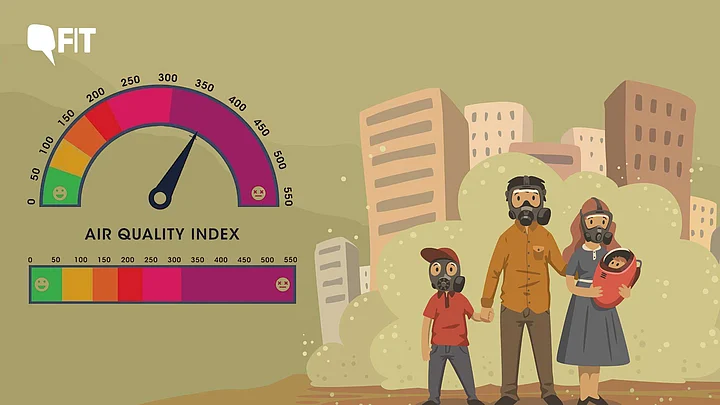If hazy skies, and coughing fits are regular features in your day, you know you're one of the millions living in India's most polluted cities, and suffering its implications.
At a time like this, keeping tabs on the air quality in your area could help you make more informed choices.
AQI, or Air Quality Index, calculates the concentration of pollutant particles like PM 2.5, PM10, CO2, O3, etc.
It’s basically a yardstick that ranks the air quality in your area on a scale from 'good' to 'hazardous' to tell you how dangerous the air you're breathing is.
A quick google search will throw up multiple results for AQI readings in your area. But, there can have discrepancies. There's also the question of - how do you know what the air quality in your house is like?
FIT breaks down the most reliable sources to check AQI levels, and also how to properly check the AQI in indoor spaces.
Checking AQI Online
First things first, many official websites use data from AQI monitoring stations in various locations to give you a picture of what the air quality is like in your area.
The Ministry of Earth Science’s System of Air Quality and Weather Forecasting And Research (SAFAR) AQI is one good official source you can refer to.
SAFAR AQI monitors concentrations of particulate matter, nitrogen, carbon monoxide, and other pollutants, and here you can get real time readings.
But, the downside is that they have a cap of 999 on their readings. So, if the air Quality in your area is over 999 it just won’t show an accurate picture.
This can be a major issue in highly polluted parts of the county, like some parts of Delhi-NCR, where the actual AQI can sometimes go up beyond the cap.
AQICN is another reliable site to check AQI of your locality.
It uses data from government sources like Central Pollution Control Board, the India Meteorological Department, and also the Delhi Pollution Control Committee.
The readings are not real-time. But they inform you when the reading was last updated, and it's usually within a couple of hours.
If you want to know the average AQI in a city, and not the AQI of specific locations, the Central Pollution Control Board (CPCB) releases a report of the 24-hour average AQI of 180 cities of India every day at 4 pm.
You'll find this on the CPCB website, and also their Twitter handle.
How to Check the Air Quality Indoors
Now, if you spend most of your time in indoor spaces, you might want to check the indoor air pollution levels.
It’s a myth that staying in can protect you from the toxic conditions outside.
For one, there is little distinction between the air outside and the air inside. Moreover, our homes are often sources for air pollution in itself.
To check this, you can use a portable AQI monitor. Place the machine in your room to find out what the air quality is like in there.
Although it can give you a good enough idea of how bad or good the air quality in your room is, it must be noted that these gadgets have been found to not be very accurate.
One way handy to know how accurate your monitor is by checking the air quality outside using the device, and then comparing it to reliable data on the air quality in your area.
While checking the AQI in a room with a monitor, remember,
It's best to place the AQI meter at breathing height, like on a table.
Don’t keep it too close to a heater, or air conditioner, or air purifiers if you have them running.
Protecting yourself from Pollution
Although it's good to check the AQI, it's not a flawless system, and is merely there as an indicator of air quality.
But also, you don’t necessarily need to know the exact AQI to know how bad the situation is. There's extensive research now that points to how air pollution can adversely impact your health.
When air pollution season takes hold, few can afford to flee the city and seek refuge in greener places with fresher air. For the rest of us, when the air quality falls to ‘unhealthy’ or worse, it's advised you take precautionary measures to protect yourself.
Wear an N95 mask when you step out
Use an air purifier if you’re able to
Don't burn incense, camphor, candles and other objects that can increase smoke indoors, and further cause irritation.
Do not do strenuous exercise
Avoid smoking, especially indoors

